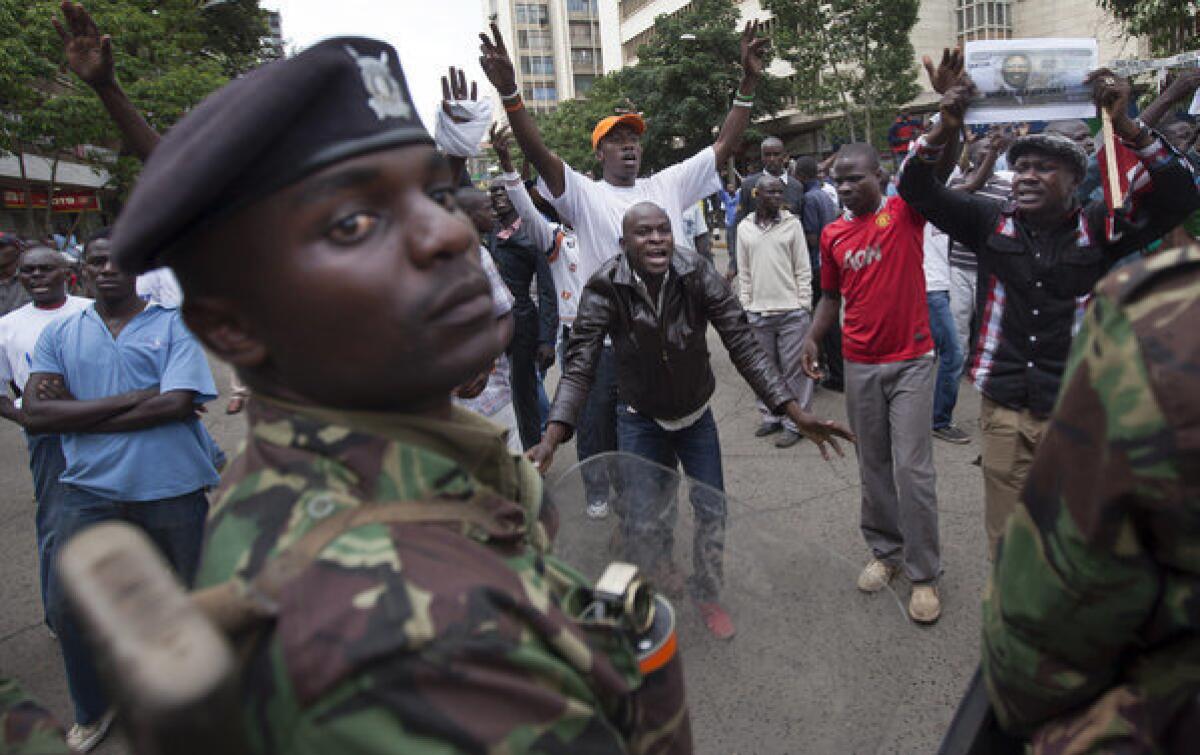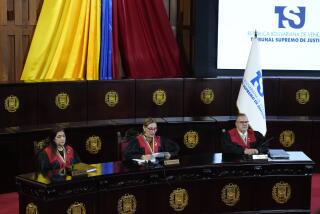Court confirms election of Kenyatta as Kenya’s president

- Share via
JOHANNESBURG, South Africa -- The second-place finisher in Kenya’s recent presidential election accepted a unanimous Supreme Court ruling Saturday that his chief rival, Uhuru Kenyatta, was the rightful winner.
The court ruled the election was free and fair.
Raila Odinga, who trailed Kenyatta in the balloting, said he still believed the election was marred with irregularities. But he called on Kenyans to unite around Kenyatta as president for the sake of peace.
Police fired tear gas to remove protesters outside the Supreme Court, and there was a heavy security presence in Nairobi’s slums late Saturday after reports of violent protests in some areas.
In the western city of Kisumu, an Odinga stronghold, crowds looted shops and burned tires, Reuters news service reported. Security forces dispersed the demonstrations by firing tear gas canisters and shots.
Despite the isolated cases of violence, Odinga’s swift acceptance of the verdict allayed fears of widespread rioting.
“The court has now spoken. I wish the president-elect, honorable Uhuru Kenyatta, and his team well,” Odinga told a news conference in Nairobi, the capital.
Kenya’s toughly fought election and questions over the results had raised fears of a repeat of violence that spread across the country in late 2007 and early 2008 after another disputed contest.
This time, critics complained, Kenyans were so keen to avoid a repeat of the previous violence that the nation’s media downplayed a series of disturbing missteps by the Independent Election and Boundaries Commission.
The Supreme Court decision leaves the country with its two top officials facing an international trial for war crimes. Kenyatta and his running mate, William Ruto, have been accused of inciting the 2007-08 post-election violence and have been indicted in the International Criminal Court at the Hague with crimes against humanity.
But there are doubts about whether witnesses will have the courage to testify against Kenya’s two most powerful men, with several people having already recanted their statements.
The war crimes trial also creates a delicate situation for Western nations, which normally have a policy of shunning war crimes suspects.
Odinga’s lawyers argued that the election was fraught with irregularities and that Kenyatta failed to win the outright majority of votes needed to avoid a runoff election.
On Saturday, Odinga criticized the Supreme Court for failing to allow his legal team to present evidence to the court, saying that “in the end Kenyans lost the right to know what indeed happened.”
Odinga’s political alliance, CORD, and a group of civic activists, the African Center for Open Governance, both filed petitions in the Supreme Court challenging the election result, which saw Kenyatta avoid a second-round vote by the narrowest of margins, just 8,000 votes.
Hearings on the petitions lasted a week, with the court rejecting attempts by CORD to introduce evidence on irregularities, saying the group had tried to present the evidence too late. The constitution provides tight deadlines on election challenges to ensure the election disputes do not drag on.
Kenyatta is expected to be sworn into office on April 9.
ALSO:
North Korea’s Kim is making U.S. officials nervous
Interview: Why the world is losing faith in democracy
Global arms trade treaty still has a shot, backers say
More to Read
Sign up for Essential California
The most important California stories and recommendations in your inbox every morning.
You may occasionally receive promotional content from the Los Angeles Times.










